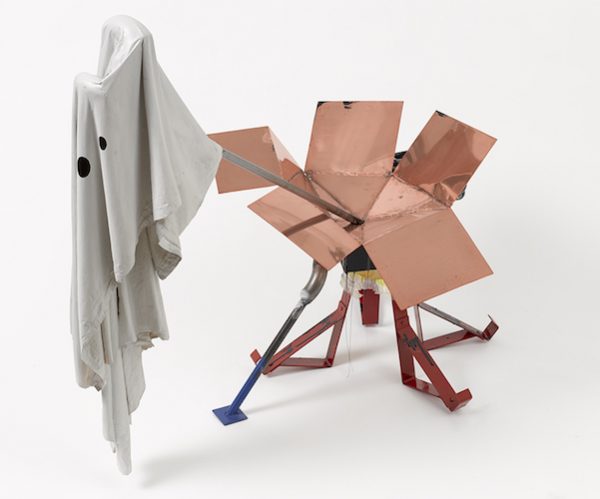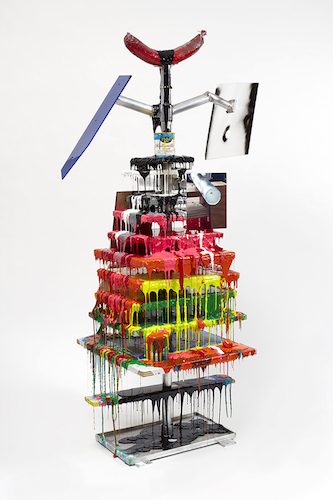Visual Arts Review: “Harry Dodge: Works of Love” — Meaning Comes Extra
By Timothy Francis Barry
I fell for the Harry Dodge exhibition, but I confess to not entirely ‘getting the picture.’

Harry Dodge, The Ideal Genie. 2016. Photo: Sean Dungan.
Harry Dodge: Works Of Love, at Tufts University’s Art Gallery at the Aidekman Arts Center, Tisch Family Gallery, 40 Talbot Ave, Medford, MA, through April 14.
“I met him at the candy store, he turned around and smiled at me….You get the picture? ‘Yes, we see’ That’s when I fell for the leader of the pack.”
The ‘pack’ that the multifarious artist-of-the-moment Harry Dodge is leading consists of sculptors who don’t exactly sculpt, painters who mostly eschew paint, installation-inclined artists who put together groups of objects that may or may not impart meaning. Narrative is a no-no in this new world of art making.
And yet. And yet. Wandering through Dodge’s exhibition, an agenda accrues. Well not precisely an agenda, per se; rather, an inclination. Sexuality, gender-fluidity. A worldview fascinated by phalli, ‘tighty-whities,’ and the mix-and-match impulse to create that fueled works by Robert Rauschenberg lo a half-century ago; ‘combines,’ in which a goat’s head and a rubber tire became a poetic construct.
In Dodge’s (not the name on the birth certificate I’d be willing to wager, not that it matters- — get it? Artful Dodger!) aesthetic take, combining disparate elements becomes a canny and winning recipe for visually stunning works. Color is front and center. As is gloss. And some of the most staggering pieces here wield a shockingly clever concept — what if you captured a moment, froze it in time, replete with drips that dried in situ, and presented it as a screen-grab — in 3-D. Brilliant.
Along one wall is a collection of faux-anthropological artifacts; tools, claw-hammers, primitive implements of variable usages. The tableaux raises an interesting question: is Dodge an archivist, in the sense of cataloguing a historical remnant? Or is the upshot that hand-tools betray a number of different textual trails. Do the leavings of previous civilizations speak to what we experience today? The jury’s out.

Harry Dodge, Pure Shit Hotdog Cake, 2017. Photo: Sean Dungan.
Some of the sculpture are beautiful, in the classical sense of aesthetics, others are defiantly ugly, as in “Pure Shit Hotdog Cake,” which I saw at the New Museum in New York, last year at their landmark Queer Art show (”Trigger: Gender As A Tool And A Weapon”). ‘Hotdog’ admixes a banana (sometimes a cigar is just a cigar….), what appear to be Swiffer domestic floor-cleaning heads, and a whole lot of wax and paint drips on a plinth that approximates a layer cake. Horrific. Yet .. somehow riveting.
Other sculptures in the exhibition hark back to mid-century steel work by the likes of Julio Gonzales, Herbert Ferber, David Smith. The post-Modernist conceit of borrowing freely from the art-historical canon is in full effect here; the videos acknowledge the early works of Sadie Benning while the screen-grab pieces would have nestled nicely at many a Whitney Biennial.
One wouldn’t expect Dodge to be a babe in the woods influence-wise; as a “permanent faculty member” (curious how emphatically the emphasis made in the printed materials … as if to stress ‘he’s no adjunct!) at the vaunted CalArts University. CalArts is known for the most cutting-edge, anti-commercial art-making; think professors like John Baldessari, Charles Gaines, and the rising art-star Paul Sepuya. So, Dodge is no primitive. This is well-thought-out subversion.
I fell for the Dodge exhibition, but I confess to not entirely ‘getting the picture.’ Which is okay; work of this nature is not something you ‘get,’ necessarily; rather, you absorb it, ruminate upon it, revel in its lush surfaces and jarring juxtapositions, then later….
Note: On March 6, there will be a gallery tour with Harry Dodge at 10 p.m. at the Tisch Family Gallery. Also on March 6 at 7 p.m. the Museum of Fine Arts Boston’s Beckwith Lecture will feature Harry Dodge and Amy Stillman.
Tim Francis Barry studied English literature at Framingham State College and art history at the University of Massachusetts-Dartmouth. He has written for Take-It Magazine, The New Musical Express, The Noise, and The Boston Globe. He owns Tim’s Used Books and TB Projects, a contemporary art space, both in Provincetown.
